List of government ministries of Thailand
The Government Ministries of Thailand (Thai: กระทรวง: Krasuang) are the government agencies that compose the executive branch of the Government of Thailand. Each ministry is headed by a minister of state (Thai: รัฐมนตรีว่าการกระทรวง, RTGS: Ratthamontri Wa Kan Krasuang) and, depending on the prime minister, several deputy ministers (Thai: รัฐมนตรีช่วยว่าการกระทรวง) . The combined heads of these agencies form the Cabinet of Thailand. There are 19 ministries.[1] The combined employees of these departments make up the civil service of Thailand.
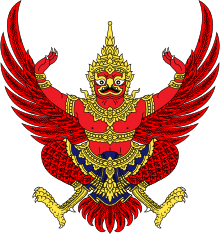 |
|---|
| This article is part of a series on the politics and government of Thailand |
|
|
|
|
|
Administrative divisions |
|
|
Ministries
The present structure of the Royal Thai Government is unchanged since the Administrative Reorganisation Act, BE 2545 (2002). The cabinet includes 19 ministries plus the Office of the Prime Minister (OPM). A new, twentieth ministry, the "Ministry of Higher Education, Science, Research and Innovation", is due to be established in June 2019. The government has allocated 130 billion baht to the new ministry for fiscal year 2020, which starts 1 October 2019.[2]
| Ministry Name | Created | Head | Seal | |||
|---|---|---|---|---|---|---|
| English | Thai | Romanised (RTGS) |
Image | Name | ||
| Office of the Prime Minister | สำนักนายกรัฐมนตรี | Samnak Nayok Ratthamontri | 1960 | Minister | 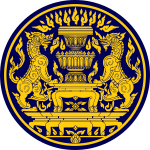 |
Seal of Rajasiha and Gajasiha, the Protectors of the Constitution |
| Ministry of Defence | กระทรวงกลาโหม | Krasuang Kalahom | 1887 | Minister | 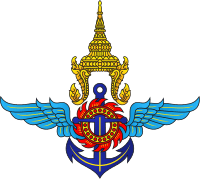 |
Seal of the Thai Armed Forces |
| Ministry of Finance | กระทรวงการคลัง | Krasuang Kan Khlang | 1875 | Minister |  |
Seal of the Bird of Paradise |
| Ministry of Foreign Affairs | กระทรวงการต่างประเทศ | Krasuang Kan Tang Prathet | 1840 | Minister |  |
Seal of the Crystal Lotus |
| Ministry of Tourism and Sports | กระทรวงการท่องเที่ยวและกีฬา | Krasuang Kan Thong Thiao Lae Kila | 2002 | Minister | 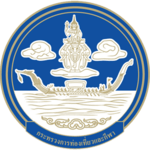 |
Seal of the Lord of Strength on the Back of Airavata |
| Ministry of Social Development and Human Security | กระทรวงการพัฒนาสังคมและความมั่นคงของมนุษย์ | Krasuang Kan Phatthana Sangkhom Lae Khwam Man Khong Khong Manut | 2002 | Minister | Seal of the Lord of Creatures | |
| Ministry of Higher Education, Science, Research and Innovation | กระทรวงการอุดมศึกษา วิทยาศาสตร์ วิจัยและนวัตกรรม | Krasuang Kan Udomsueksa Witthayasat Wijai Lae Nawattakam | 2019 | Minister | ||
| Ministry of Agriculture and Cooperatives | กระทรวงเกษตรและสหกรณ์ | Krasuang Kaset Lae Sahakon | 1892 | Minister |  |
Seal of Varuna on Naga's Back |
| Ministry of Transport | กระทรวงคมนาคม | Krasuang Khamanakhom | 1912 | Minister | 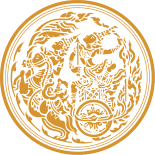 |
Seal of Rama on the Chariot |
| Ministry of Digital Economy and Society | กระทรวงดิจิทัลเพื่อเศรษฐกิจและสังคม | Krasuang Digital Phuea Setthakit Lae Sangkhom | 2016 | Minister | 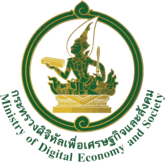 |
Seal of Budha |
| Ministry of Natural Resources and Environment | กระทรวงทรัพยากรธรรมชาติและสิ่งแวดล้อม | Krasuang Sapphayakon Thammachat Lae Sing Waet Lom | 2002 | Minister | Seal of the Shield of Nature | |
| Ministry of Energy | กระทรวงพลังงาน | Krasuang Phalang Ngan | 2002 | Minister |  |
Seal of Lokuttara |
| Ministry of Commerce | กระทรวงพาณิชย์ | Krasuang Phanit | 1892 | Minister |  |
Seal of Vishvakarman |
| Ministry of Interior | กระทรวงมหาดไทย | Krasuang Mahatthai | 1892 | Minister | 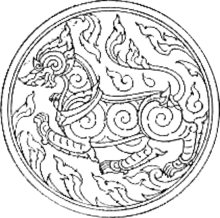 |
Seal of the Lion |
| Ministry of Justice | กระทรวงยุติธรรม | Krasuang Yuttitham | 1891 | Minister | 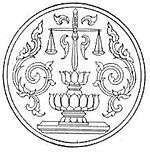 |
Seal of the Scales of Justice |
| Ministry of Labour | กระทรวงแรงงาน | Krasuang Raeng Ngan | 1993 | Minister | Seal of the Three Deities | |
| Ministry of Culture | กระทรวงวัฒนธรรม | Krasuang Watthanatham | 2002 | Minister | 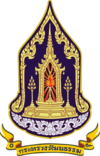 |
Seal of the Illumed Baldachin |
| Ministry of Education | กระทรวงศึกษาธิการ | Krasuang Sueksathikan | 1892 | Minister | 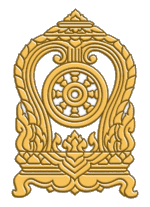 |
Seal of the Wheel of Law |
| Ministry of Public Health | กระทรวงสาธารณสุข | Krasuang Satharanasuk | 1942 | Minister | 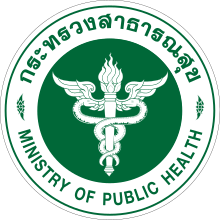 |
Seal of Caduceus
(Renew Seal Design in 2016) |
| Ministry of Industry | กระทรวงอุตสาหกรรม | Krasuang Utsahakam | 1942 | Minister | 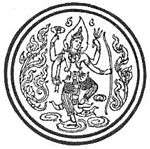 |
Seal of Narayana Churning the Ocean of Milk |
History
During the Rattanakosin Period, the kingdom's administration was similar to that of the Ayutthaya Period. There were two chief ministers (Thai: อัครมหาเสนาบดี: Akkhramahasenabodi): the first running military affairs or samuhakalahom (Thai: สมุหกลาโหม), and the second Samuhanayok (Thai: สมุหนายก) for civilian affairs. The civilian ministry was divided further into four kroms (Thai: กรม), headed by a senabodi (Thai: เสนาบดี) or 'minister'. This type of administration was called the Chatusadom (Thai: จตุสดมภ์) :
| Ministries | |||
|---|---|---|---|
| Name | Thai Name | Head | Purpose |
| Krom Nakhonban or Kromma Wiang | กรมนครบาล หรือ กรมเวียง | Senabodi | Cities and local administration |
| Kromma Wang | กรมวัง | Senabodi | Palace affairs |
| Kromma Khlang | กรมคลัง | Senabodi | Treasury and trade |
| Kromma Na | กรมนา | Senabodi | Agriculture and land |
Rama V reforms
King Chulalongkorn (Rama V), who had received a European education and traveled widely, reformed the administration of the state. In 1875, he issued a royal decree to bring about this reform, dividing and creating many departments, and thereby preventing the archaic system from collapsing.
The administrative reforms of Chulalongkorn created six ministries (Thai: กระทรวง: krasuang), each headed by a minister of state or (Thai: รัฐมนตรี, RTGS: ratthamontri):
| Ministries | ||||
|---|---|---|---|---|
| Name | Thai Name | RTGS | Head | Purpose |
| Ministry of Interior | กระทรวงมหาดไทย | Krasuang Mahatthai | Minister | Local administration and the north |
| Ministry of War | กระทรวงยุทธนาการ | Krasuang Yuttana Thikarn | Military and the south | |
| Ministry of Metropolitan | กระทรวงนครบาล | Krasuang Nakhonban | Bangkok and surrounding area | |
| Ministry of the Royal Household | กระทรวงวัง | Krasuang Wang | Palace affairs | |
| Ministry of Finance | กระทรวงการคลัง | Krasuang Kan Khlang | Finance and commerce | |
| Ministry of Agriculture | กระทรวงเกษตราธิการ | Krasuang Kasettrathikarn | Agriculture and land | |
A further four were soon added:
| Ministries | |||
|---|---|---|---|
| Name | Thai Name | Head | Purpose |
| Ministry of Foreign Affairs | กระทรวงการต่างประเทศ | Minister | Foreign affairs and relations |
| Ministry of Justice | กระทรวงยุติธรรม | Minister | Justice and the judiciary |
| Ministry of Transport and Communication | กระทรวงโยธาธิการ | Minister | Transport and communication (railways and telegrams) |
| Ministry of Education | กระทรวงธรรมการ | Minister | Education |
By 1900 the entire structure was formed. The ten ministries became the center of Siamese government and rule. After the 1932 Revolution, most of the ministries were retained by the Khana Ratsadon, however from then on the ministers were chosen by the prime minister and not the king.
See also
- Cabinet of Thailand
- Independent agencies of the Thai government
- Government of Thailand
- List of state enterprises of Thailand
- Politics of Thailand
- Prime Minister of Thailand
References
- "Government Agencies". Office of the Prime Minister (OPM) (Thailand). Retrieved 5 July 2016.
- Theparat, Chatrudee (25 April 2019). "Novel R&D ministry 80% ready". Bangkok Post. Retrieved 26 April 2019.
External links
- Official webpage
- Reshaping Thailand through Bureaucratic Reform and Development
- The History of Thailand's Administration Website of the Department of Provincial Administration – DOPA (in English) ( Internet archive of 25 November 2009)